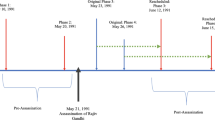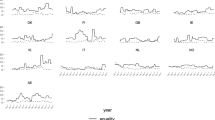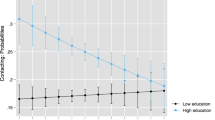Abstract
As is well known, Chinese central government has full authority to determine the provincial and local officials’ turnover. However, China has not in detail interpreted the standards of officials’ promotions so far. In this paper, the latest database of city-level leaders for the period between 2002 and 2013 is utilized to investigate the influences of economic performance on party secretaries’ odds of being promoted. The estimation results by a panel multinomial logit method indicate that municipal annual GDP per capita is significantly positively associated with leaders’ chances of promotion. Specifically, the average GDP growth rates during leaders’ tenures have much higher effects. Moreover, some important factors of leaders’ personal characteristics also affect the political turnover. For instance, party secretaries’ connection with China’s Communist Youth League, political experience, educational level and professional expertise all have positive impacts on their chances of obtaining a promotion. In contrast, leaders’ ages and tenures are found to be negatively related to their promotion possibilities.
Similar content being viewed by others
Notes
The term “administration decentralization” here refers to the redistribution of decision making authority and financial and management responsibilities among different levels of sub-central government. During the reform era, China’s central government had gradually transferred some authority and political power to provinces and lower-level government, and allowed them to make some decisions or even launch new reforms that are important to local economic development. Some scholars argued that China’s administration decentralization, although not thoroughly, contributed significant to China’s phenomenal economic performance since the reform and opening-up started in 1970 s (e.g., Montinola et al. 1995; Jin et al. 2005; Cai and Treisman 2006).
The fixed-effects model calculates means for each variable and then subtracts the means; the constant and individual effects are also eliminated by this transformation eliminating unobserved heterogeneity by taking deviations from individual mean periods.
The variables that hardly vary over time should thus be excluded from the model (Mierau et al. 2007).
For more information on the database, please refer to http://www.hotelaah.com/liren/index.html.
For the logit model, if the coefficient of one explanatory variable is estimated to be β, the increase in the odds for the dependent variable to be 1 is exp (β) − 1 once there is a marginal increase in the value of the explanatory variable. For more details, refer to Wooldridge (2016).
In this paper, the classification of eastern, central and western regions is in accordance with the guidelines of the National Bureau of Statistics of China (NBS). Specifically, the eastern region includes Beijing, Tianjin, Hebei, Shanghai, Jiangsu, Zhejiang, Fujian, Shandong, Liaoning, Guangdong, Guangxi and Hainan; the central region contains Shanxi, Inner Mongolia, Jilin, Heilongjiang, Anhui, Jiangxi, Henan, Hubei and Hunan; and the western region includes Sichuan, Guizhou, Yunnan, Shaanxi, Gansu, Ningxia, Qinghai and Xinjiang. The geological location of a city depends on the location of the province it is in.
For more information, please refer to http://www.bloomberg.com/news/articles/2014-03-12/chinese-cadres-told-going-green-rivals-gdp-to-get-ahead-in-party.
References
Bardhan, P.: Awakening giants, feet of clay a comparative assessment of the rise of China and India. J. South Asian Dev. 1(1), 1–17 (2006)
Bertrand, M., Schoar, A.: Managing with style: the effect of managers on firm policies. Q. J. Econ. 118(4), 1169–1208 (2003)
Blanchard, O., Shleifer, A.: Federalism with and without political centralization: China versus Russia. IMF Econ. Rev. 48(1), 171–179 (2001)
Bo, Z.: Chinese Provincial Leaders: Economic Performance and Political Mobility Since 1949. M. E. Sharpe, Armonk (2002)
Bo, Z.: The 16th central committee of the Chinese Communist Party: formal institutions and factional groups. J. Contemp. China 13(39), 223–256 (2004)
Cai, H., Treisman, D.: Did government decentralization cause China’s economic miracle? World Polit. 58(04), 505–535 (2006)
Chamberlain, G.: Analysis of covariance with qualitative data. The Rev. Econ. Stud. 47(1), 225–238 (1980)
Chen, S.: From governance to institutionalization: political selection from the perspective of central-local relations in China—Past and Present (1368–2010). Department of Economics, Fudan University Working Paper (2015)
Choudhry, M.T., Elhorst, J.P.: Demographic transition and economic growth in China, India and Pakistan. Econ. Syst. 34(3), 218–236 (2010)
Chow, G.C.: Capital formation and economic growth in China. Q. J. Econ. 108(3), 809–842 (1993)
Chow, G.C., Li, K.W.: China’s economic growth: 1952–2010. Econ. Dev. Cult. Change 51(1), 247–256 (2002)
Guo, G.: Retrospective economic accountability under authoritarianism evidence from China. Polit. Res. Q. 60(3), 378–390 (2007)
Jang, C.L., Chang, C.P.: National income and fishery consumption: a global investigation. Econ. Res. 27(1), 15–33 (2014)
Jin, H., Qian, Y., Weingast, B.R.: Regional decentralization and fiscal incentives: federalism, Chinese style. J. Public Econ. 89(9), 1719–1742 (2005)
Jones, B.F., Olken, B.A.: Do leaders matter? National leadership and growth since world war II. Q. J. Econ. 120(3), 835–864 (2005)
Landry, P.F.: The political management of mayors in post-Deng China. Cph. J. Asian Stud. 17, 31–58 (2003)
Li, C.: Reshuffling four tiers of local leaders: goals and implications. China Leadersh. Monit. 18, 1–22 (2006)
Li, C., Bachman, D.: Localism, elitism, and immobilism: elite formation and social change in post-Mao China. World Polit. 42(01), 64–94 (1989)
Li, H., Zhou, L.A.: Political turnover and economic performance: the incentive role of personnel control in China. J. Public Econ. 89(9), 1743–1762 (2005)
Li, P., Lu, Y., Wang, J.: Does flattening government improve economic performance? Evidence from China. J. Dev. Econ. 123, 18–37 (2016)
Maskin, E., Qian, Y., Xu, C.: Incentives, information, and organizational form. Rev. Econ. Stud. 67(2), 359–378 (2000)
MacFarquhar, R. (ed.): The Politics of China: Sixty Years of the People’s Republic of China. Cambridge University Press, Cambridge (2011)
Mierau, J. O., Jong-A-Pin, R., De Haan, J.: Do political variables affect fiscal policy adjustment decisions? New empirical evidence. Public Choice 133(3), 297–319 (2007)
Montinola, G., Qian, Y., Weingast, B.R.: Federalism, Chinese style: the political basis for economic success in China. World Polit. 48(01), 50–81 (1995)
Opper, S., Brehm, S.: Networks versus performance: political leadership promotion in China. Department of Economics, Lund University (2007)
Opper, S., Nee, V., Brehm, S.: Homophily in the career mobility of China’s political elite. Soc. Sci. Res. 54, 332–352 (2015)
Qian, Y., Weingast, B.R.: Federalism as a commitment to perserving market incentives. J. Econ. Perspect. 11(4), 83–92 (1997)
Qian, Y., Roland, G.: Federalism and the soft budget constraint. Am. Econ. Rev. 88(5), 1143–1162 (1998)
Shambaugh, D.: Facing reality in China policy. Foreign Aff. 80, 50–64 (2001)
So, Y., Kuhfeld, W.F.: Multinomial logit models. In: SUGI 20 Conference Proceedings, pp. 1227–1234 (1995)
Sun, Z., Chang, C.P., Hao, Y.: Fiscal decentralization and China’s provincial economic growth: a panel data analysis for China’s tax sharing system. Qual. Quant. 51, 2267–2289 (2017)
Tyers, R.: Looking inward for transformative growth. China Econ. Rev. 29, 166–184 (2014)
Wang, Y., Yao, Y.: Sources of China’s economic growth 1952–1999: incorporating human capital accumulation. China Econ. Rev. 14(1), 32–52 (2003)
Weeks, M., Yudong Yao, J.: Provincial conditional income convergence in China, 1953–1997: a panel data approach. Econom. Rev. 22(1), 59–77 (2003)
Wei, Y., Liu, B., Liu, X.: Entry modes of foreign direct investment in China: a multinomial logit approach. J. Bus. Res. 58(11), 1495–1505 (2005)
Wooldridge, J.M.: Introductory Econometrics: A Modern Approach, 6th edn. Cengage Learning, Boston (2016)
Wu, M., Chen, B.: Assignment of provincial officials based on economic performance: evidence from China. China Econ. Rev. 38, 60–75 (2016)
Wu, Y.: Is China’s economic growth sustainable? A productivity analysis. China Econ. Rev. 11(3), 278–296 (2000)
Xu, C.: The fundamental institutions of China’s reforms and development. J. Econ. Lit. 49(4), 1076–1151 (2011)
Xu, X., Wang, X.: Growth behavior in the appointment economy. China Econ. Q. 9(4), 1447–1466 (2010). (in Chinese)
Acknowledgements
The authors acknowledge financial support from the National Natural Science Foundation of China (71403015, 71521002), Beijing Municipal Natural Science Foundation (9162013), and the Joint Development Program of Beijing Municipal Commission of Education.
Author information
Authors and Affiliations
Corresponding author
Appendix
Rights and permissions
About this article
Cite this article
Shi, Y., Chang, CP., Jang, CL. et al. Does economic performance affect officials’ turnover? Evidence from municipal government leaders in China. Qual Quant 52, 1873–1891 (2018). https://doi.org/10.1007/s11135-017-0573-9
Published:
Issue Date:
DOI: https://doi.org/10.1007/s11135-017-0573-9
Keywords
- Economic performance
- Political turnover
- Municipal government leaders
- Panel multinomial logit model
- China




